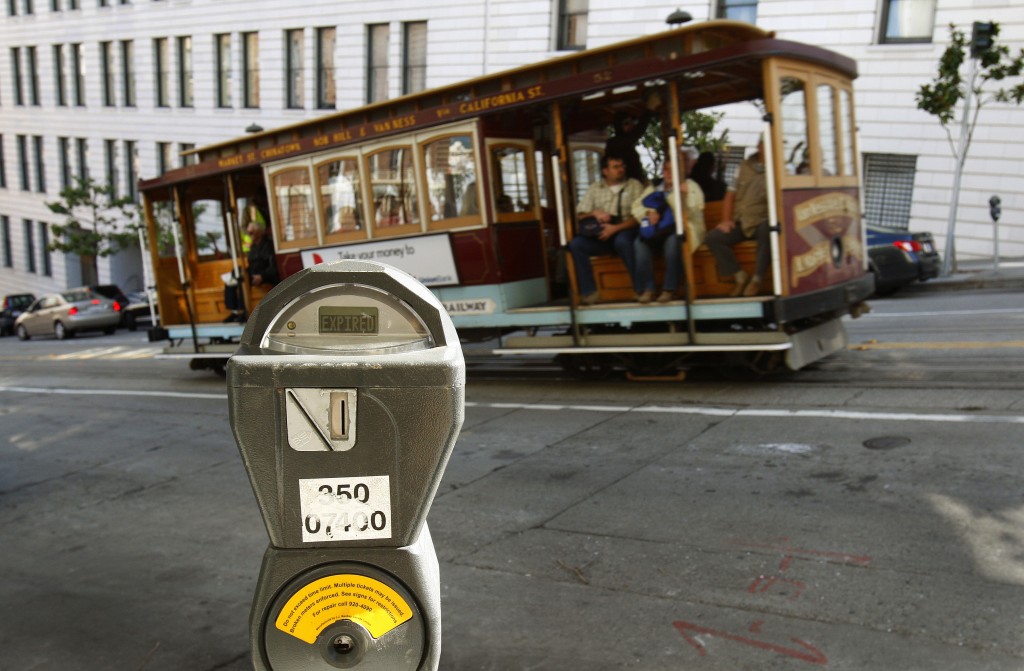San Francisco to app: Curb parking space auctions

In this Oct. 27, 2009 file photo, a cable car passes a parking meter near San Francisco’s financial district. San Francisco City Attorney Dennis Herrera on Monday, June 23, 2014 issued a cease-and-desist demand to a mobile app called Monkey Parking, which allows people to auction off public parking spaces that they’re using to other nearby drivers. AP
SAN FRANCISCO (AP) — San Francisco’s new crackdown on a mobile app that allows people to auction off their public parking spots marks yet another clash between innovative technologies and regulators trying to maintain law and order, public safety and a sense of social decorum.
The app, called Monkey Parking, allows drivers who score a notoriously hard-to-get San Francisco parking spot to sell it for $5, $10, even $20 and then hang out there until the buyer arrives to take their place.
“It’s illegal, it puts drivers on the hook for $300 fines, and it creates a predatory private market for public parking spaces that San Franciscans will not tolerate,” City Attorney Dennis Herrera said in a statement Monday, ordering the Rome-based tech startup to stop the practice.
Herrera said people are free to rent out their own private driveways and garage spaces but the city “will not abide businesses that hold hostage on-street public parking spots for their own private profist.” Two other startups face similar letters, he said, including ParkModo, which planned to pay drivers $13 an hour to sit in their cars blocking a spot until someone buys it.
State and federal lawmakers have grappled with new technologies that people can use to privately replace taxis, hotels and even restaurants. But nowhere is the conflict tougher than in San Francisco, which Silicon Valley firms often use as a testing ground, pushing the boundaries of local authorities who don’t want to quash the booming tech economy.
Earlier this year, the city ordered Google to move a partially built four-story mystery barge from the middle of the San Francisco Bay after state officials said it was under construction without proper permits.
Police also insist ridesharing services like Uber, Lyft and Sidecar — which gained great traction during Bay Area Rapid Transit strikes last year — are operating illegally when they pick someone up at the airport, although they continue to do so, largely unchecked.
And a possible ballot initiative this fall would charge Airbnb vacation rental app users the city’s 14 percent hotel tax if they want to rent a room in their house to a stranger.
Internet industry analyst Larry Downes said the real problem is that San Francisco’s leaders have made short-sighted policy decisions on housing, development and public transit, leaving the city plagued with dense traffic and costly housing amid a tech boom.
“Instead of harassing startups trying to chip away at the problem, the city should acknowledge its many failings of leadership and do something productive,” Downes said. “Obviously, this is a warning to all app developers in the sharing economy. If they are facilitating users trying to overcome vast inefficiency and corruption in government, they become an easy target.”
San Francisco-based technology expert Charles Belle of the Startup Policy Lab, whose objective is to connect the startup community with policymakers and government, believes the issue between Monkey Parking and the city attorney is a great example of the need to create more forums for the two entities to engage.
“Companies need to be familiar with local laws, but threatened legal actions, such as cease-and-desist letters, only divert attention away from the opportunity to rethink how the community can use technology to improve government services,” said Belle, who’s a former executive director the Privacy and Technology Project at the University of California, Hastings College of the Law.
Monkey Parking CEO Paolo Dobrowolny, who was launching the app in the U.S. with a San Francisco pilot program, said ridesharing apps and other technologies that challenge mainstream businesses are delivering services that make users happy.
“As a general principle, we believe that a new company providing value to people should be regulated and not banned,” Dobrowolny wrote in an email. “Regulation is fundamental in driving innovation, while banning is just stopping it.”
Sweetch co-founder Hamza Ouazzani Chahdi, whose $5-a-parking-spot swapping app was also warned to cease and desist, said in an email that it’s just trying to reduce congestion, which creates pollution and other problems.
“We don’t understand why they want to shut us down,” he said. “We are trying to solve the huge parking problem, which is not only bad for drivers but for all the city.”
Parking in San Francisco has long been known as a driver’s worst nightmare. A recent San Francisco Municipal Transportation Agency parking census reported that the city has 440,000 parking spots available — but only 275,000 of those are street parking.
The city attorney also asked Apple Inc. to immediately remove Monkey’s application from its App Store. Apple did not immediately respond to emails seeking comment, and the app was still downloadable Monday afternoon.
RELATED STORIES